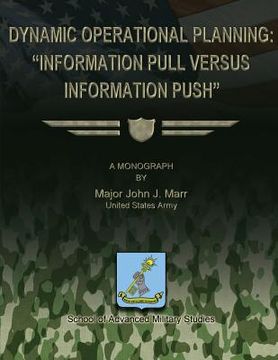Synopsis "Dynamic Operational Planning: "Information Pull Versus Information Push""
This monograph examines how the U.S. Army compares to other complex systems in the use of information to solve problems. Like most complex systems, the U.S. Army strives to attain an informational advantage over its opponents. However, according to contemporary operational theory, concepts, and U.S. Army warfighting doctrine, the significance of this informational advantage is the rapid development and execution of singular, optimal solutions. Through a detailed analysis of how operational-level staffs organize and plan, against a model for measuring static versus dynamic information-use, this monograph demonstrates that current operational theory and doctrine results in a static operational planning process. The structure of the paper validates this thesis by describing and comparing two complex systems - an operational planning staff and a professional football coaching staff - against a common model. This model, described in the first part of the paper, provides a process for evaluating a complex system's use of information on a static-to-dynamic continuum. The model conducts this evaluation by analyzing a system's organization, environmental interaction, and ability to learn. The second part of the paper describes how the two systems conceptualize and use information; an evaluation of current planning theory demonstrates "conceptualization," and an evaluation of planning organization and process demonstrates "use." The final portion of the monograph evaluates the two systems against the model, enabling a comparison of information use. This monograph concludes that in terms of complex systems, the U.S. Army's current conceptualization and use of information results in static operational-level planning. The research contained in this monograph suggests that the U.S. Army could learn much from the example provided by American football teams. When compared to the complex systems represented by a professional American football team, the U.S. Army's operational theory leads to relatively static state of organization, interaction, and improvement. In other words, with regard to information-use, current operational theory elicits a dysfunctional organization and reactive doctrinal planning process. In order for the U.S. Army to fully embrace its full potential for information-use, it must understand how to use information dynamically.

